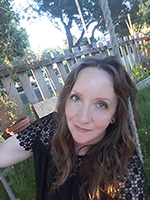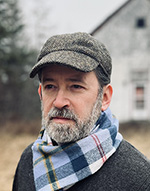|
|
Early Bird deal on now!
Kyeren Regehr,
#227 poetry contributor
 Volunteer Elizabeth Adilman talks with the issue #227 contributor about the line break as a magical device, taking time between the experience and the writing, and the incongruities between our words and our hearts. Volunteer Elizabeth Adilman talks with the issue #227 contributor about the line break as a magical device, taking time between the experience and the writing, and the incongruities between our words and our hearts.
EA: If a poem is a vessel where voices are heard in the way a bookstore might hold poetry readings, what is the conversation you are curating in “Lessons from Bewitched”?
KR:
[O]n the surface I’m talking about the way we perceive events and experiences as children, and how utterly different they are in adult recollection, and how we forget our child mind.
I began this poem in 2006 in a first-year poetry class with Carla Funk (Victoria’s first Poet Laurate)—it was the first memory poem I’d ever written. [...] As it refined, it also became about the stories we tell ourselves and the stories we tell others. How often do our words align with our internal experience? That night, my mother said something which in hindsight I hadn’t believed. It could have been an agreed upon phrase, or words said to make the divorce easier—a Band-Aid slapped across what was really being felt. She said, “we don’t love each other anymore”. That didn’t make it into the final draft, but the diary entry, which is it’s opposite, did. I think the poem might offer a small space to consider the truths we hide, the things we don’t allow ourselves to speak aloud, the spells we cast upon ourselves with our words, both publicly and privately—the incongruities between our words and our hearts.
Read the rest of Kyeren Regehr's interview.
Kevin MacDonell,
#227 cnf contributor
 Summer student Juls Macdonell talks with the issue #227 contributor about the layered selves in a memoir, the silences that surround relationships, and how memory can be more real than preservation. Summer student Juls Macdonell talks with the issue #227 contributor about the layered selves in a memoir, the silences that surround relationships, and how memory can be more real than preservation.
JM: The intangible yet intrinsic connection to our inner child is haunting, but can be deeply informative. Can you speak to what sort of relationship you have to your child self with regards to your writing?
KM:
Certain childhood memories assert themselves while I’m writing about something else. A lot of these memories seem to deal with mistaken or flawed perception, as if I’m still learning to grasp reality. For example, I remember one of my books which had a picture of a cow. I used to think the cow stayed perfectly still while I was looking at it, but then resumed grazing or whatever when the book was closed. I would close the book with my thumb on that page and then spring it open, hoping to surprise the cow in the act of living. And that’s what I have been trying to do ever since, in writing: catch life in the act. [...]
In “Tug of War,” my childish misapprehension relates to my guilt over causing the incident that could have gotten my younger brother killed. When members of my family read my piece, they assured me the incident was always considered an accident. That’s probably the case, but my child self doesn’t buy it. Whatever the facts are, the truth is that the child’s feeling of guilt remains completely intact. I, myself, today do not carry that guilt, so the child-me must still be alive, outside of time.
Read the rest of Kevin MacDonell's interview and an excerpt.
Courtney Baird-Lew,
#227 fiction contributor
 Managing Editor L'Amour Lisik talks with the issue #227 contributor about memories as foundation for a story, non-linear career paths, and belonging to two cultures while not quite belonging to either. Managing Editor L'Amour Lisik talks with the issue #227 contributor about memories as foundation for a story, non-linear career paths, and belonging to two cultures while not quite belonging to either.
LL: “Absence” serves as a meditation on grief and love, demonstrating the different ways one family reacts to the loss of a parent/child/partner. What inspired you to write this story, and what drew you to centring the young boy’s perspective?
CBL:
The story was inspired by a handful of visits I made to my Chinese grandparents’ house as a child. Their place, and the (very) few details I could remember of it, served as the story’s foundation. What I do remember is a distinct feeling of tension—of unbalance—that always hung in the air when they were around. I didn’t have the ability to discern where the tension came from, but, like any kid who is told to listen and be attentive, I could sense that things were simmering below the surface. I wanted to explore this kind of observant naïveté through a new set of eyes during a time of heartache and to see how each character would react in relation to one another. I centred the story around a young boy—someone who would carry on the family name—to see how a traditional, masculine sense of duty would start to rear its head after the loss of the family patriarch.
Read the rest of Courtney Baird-Lew's interview.
|
|
|
|
|
|
|
|
|
|
|
|